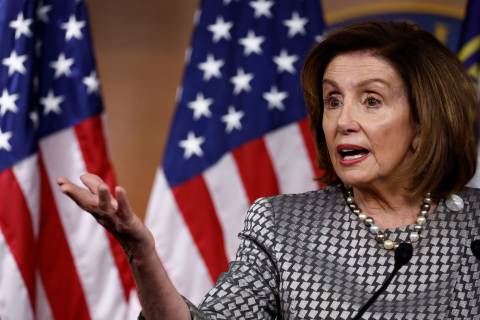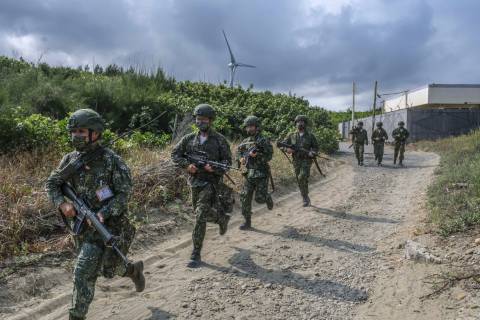(Bloomberg) -- US House Speaker Nancy Pelosi is expected to land in Taiwan on Tuesday evening in defiance of Chinese threats, a trip that would make her the highest-ranking American politician to visit the island in 25 years.

Pelosi is expected to arrive at 10:20 p.m. local time via private plane at Songshan Airport, according to the Liberty Times, one of several media outlets link to Taiwan President Tsai Ing-wen’s ruling party. In a regular briefing Tuesday afternoon, Taiwan’s Foreign Ministry said it couldn’t comment on the speculation around Pelosi’s trip.

“Taiwan always welcomes international visitors coming to Taiwan to gain a better understanding of Taiwan and to display their support for Taiwan,” Joanne Ou, a spokeswoman for the ministry, told reporters.

China, which regards Taiwan as part of its territory, has vowed an unspecified military response to any Pelosi visit that risks sparking a crisis between the world’s biggest economies. President Xi Jinping last week told President Joe Biden he would “resolutely safeguard China’s national sovereignty and territorial integrity” and that “whoever plays with fire will get burnt.”
While there are few signs China is planning a full-scale invasion of Taiwan, Beijing has responded to past visits by foreign officials with large sorties into Taiwan’s air defense identification zone or across the median line that divides the strait. A large number of PLA warplanes flew close to the median line Monday morning, Taiwan’s TVBS reported, adding that Taiwanese military warships were also deployed in what it called a routine operation.
Taiwan’s Defense Ministry said in a statement Tuesday that the island’s military was prepared to send “appropriate armed forces according to the threat.” “The military is determined, confident and capable of ensuring national security,” it added.
Caution washed across financial markets in the countdown to Pelosi’s visit. MSCI Inc.’s Asia-Pacific stock index slid the most in three weeks, with some of the steepest falls in Hong Kong, China and Taiwan. US and European equity futures were also in the red. Treasuries and the yen climbed amid demand for havens.
Read more: This Is Why China Is So on Edge About Pelosi’s Trip to Taiwan
Pelosi on Tuesday held meetings in Malaysia, the second stop on her swing through Asia that kicked off a day earlier in Singapore. People familiar with the matter said she would visit Taiwan after Malaysia, before she heads to South Korea and Japan -- two staunch US allies.
The US politician will visit Taiwan’s parliament Wednesday morning and have lunch with Tsai, according to the Apple Daily newspaper.
Pelosi would become the highest-ranking American politician to visit Taiwan since then-House Speaker Newt Gingrich did so in 1997. Chinese Foreign Ministry spokesman Zhao Lijian said Monday that Pelosi’s stature as the No. 3 official in the US made her trip highly sensitive, reiterating the army “won’t sit idly by.”
China’s reaction to Pelosi’s visit will be closely watched. A spokesman for the White House National Security Council, John Kirby, said on MSNBC Monday that Beijing shouldn’t view her trip as a provocation. He added that it’s “disconcerting that the Chinese might use this as some sort of pretext to actually increase the tensions.”
Chinese media outlets including the Communist Party’s Global Times have suggested the People’s Liberation Army would respond aggressively to a Pelosi trip, possibly by sending warplanes right over the island.
Taiwan would then need to decide whether to shoot them down, a move that could trigger a wider military conflict. China would have to weigh the possibility that America and its allies in the region would be drawn in militarily.
Biden said in May that Washington would intervene to defend Taiwan in any attack from China, although the White House later clarified he meant the US would provide weapons, in accordance with existing agreements.
Under the deal reached in 1978 to normalize relations between China and the US, Washington agreed to recognize only Beijing as the seat of China’s government, while acknowledging -- but not endorsing -- the Chinese position that there is but one China and Taiwan is part of China.
The US has insisted that any unification between the island and mainland must be peaceful, and supplied Taiwan with advanced weaponry while remaining deliberately ambiguous about whether US forces would help defend against a Chinese attack.
Visits by lower level US lawmakers have also prompted military responses by China. Last November, Chinese warplanes flew around the east side of the island after a visit by a US congressional delegation.
The last major crisis in Taiwan came in 1995-96, when China lobbed missiles into the sea near ports and then-President Bill Clinton sent two aircraft carrier battle groups to the area. Gingrich visited both Taiwan and China the year after that episode, telling Beijing the US would defend the island.
More stories like this are available on bloomberg.com
©2022 Bloomberg L.P.
Author: Cindy Wang and Debby Wu
